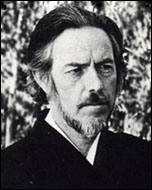You are here
| Size | Seeds | Peers | Completed |
|---|---|---|---|
| 293.47 MiB | 0 | 0 | 0 |

Alan Watts
Biography
Born in 1915, Alan Watts is known all over the world as a philosopher, writer, speaker, and authority on comparative religion. During his teen years he was faced with the decision of accepting his parent's Anglican faith or Buddhism, which he had been learning about in various libraries for many years. He ended up choosing Buddhism, and immediately sought membership in a local Buddhist Lodge.
Before long, Watts found work in a printing house and spent his spare time involved in Buddhist study. During his late teens he came into the contact of eminent spiritual authors and met esteemed scholar D.T. Suzuki. It was also at this point that Watts became steeped in the fundamental concepts and main terminologies of India and East Asia. By 21 he had already written his first book and was off to America with his new bride.
In America, a succession of life changes, including the dissolution of his marriage and his leaving the ministry led Watts to the West Coast. Here he began a life in academia and started writting the books on eastern religion that would make him famous. Watts never affiliated himself with one Academic Organization in particular, but was sought after as a lecturer at many universities.
His main philosophy was informed by the spiritual paths of Asia, and over time his stated goal was to bridge the gap between eastern and western religious philosophies. Watts is now considered one of the most popular modern philosophers and his bibliography is considered by many to be some of the most important texts on the Tao, Zen and Eastern Religion in general.
This set features:
# Not What Should Be, But What Is!
Not what might be, not what should be, but what is! Is the Western idea of God still intellectually plausible?
# Spiritual Authority
What is the ultimate source of spiritual authority, and how is it that we empower our beliefs, our religions, and our gods?
# Jesus: His Religion?
The message of Jesus has been filtered down to us through Christianity. But is this what Jesus originally taught?
# Democracy in Heaven
Although we live in a democratic society, our models of divinity reflect a courtly hierarchy between men and gods.
# Image of Man
Is it the incarnate spirit or the omnipotent cosmic ruler?
# Sex in the Church
The ongoing love/hate dialogue between religion and sexuality.
- Log in to post comments
